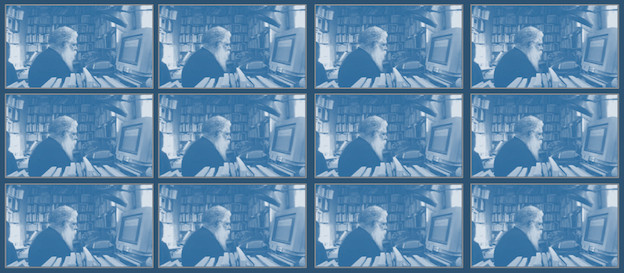A toast to Chip Delany

Chip started teaching at Temple University in 2001. His office is next door to mine, so I know he gives great phone interviews. And I know that no matter who wanders in looking for him — whether an eager fan or a teenage student who hasn’t yet read any of his works — they will receive the same enthusiastic greeting and invitation to come in and sit down. No matter how busy he is, he can always make time to talk about literature.
Neil Gaiman adores him and because of that agreed to read for the Temple Creative Writing program. Junot Diaz adores him and because of that agreed to read at Temple. Eileen Myles adores him and because of that … well you get where I’m going with this. We, who are gathered here today, are just a small part of his vast army of admirers. But “army” of course is not the right word: not only because Chip is perhaps one of the most gentle gentlemen I know, but also because a military force is charged with supporting a singular cause, and Chip’s writing practice is anything but singular. There are the fans of his science-fiction novels, there are the fans of his non-science-fiction novels, the admirers of his critical works, and admirers of his memoir-writing … the reasons to love Chip’s work are manifold and his audiences are equally various.
I think one of the questions lurking behind this gathering today is why, when poetry isn’t one of Chip’s writing practices, are poets such big fans of his work?
His book Dark Reflections is about a poet — but I would argue that the character of Arnold Hawley is the kind of poet who exists only in novels, and whose ideas about poetry seem less relevant to the contemporary poetic enterprise than Delany’s own prose. So what is it that makes Chip’s work feel so relevant to poetry and poetics?
I don’t have time to treat the question with the scholarly rigor it deserves, but I can try to tell you briefly what the answer is for me:
In the introduction to his memoir The Motion of Light in Water, Chip tells a story about how, in constructing a chronology of his life for two Pennsylvania scholars, he wrote “My father died of lung cancer in 1958 when I was seventeen.” The scholars then informed him that this autobiographical fact was impossible — that if he had been born in 1942, he would have been sixteen in 1958, but additionally, his father had actually died in 1960, at which time Delany would have been eighteen. While ruminating on the ramifications of his mistake Delany asks us to “bear in mind two sentences”:
“My father died of lung cancer in 1958 when I was seventeen.”
“My father died of lung cancer in 1960 when I was eighteen”
The first is incorrect, the second correct.
I am as concerned with truth as anyone — otherwise I would not be going so far to split such hairs. In no way do I feel the incorrect sentence is privileged over the correct one. Yet, even with what I know now, a decade after the letter from Pennsylvania, the wrong sentence still feels to me righter than the right one.
Now a biography or a memoir that contained only the first sentence would be incorrect. But one that omitted it, or did not at least suggest its relation to the second on several informal levels would be incomplete.
This statement asks us to think about knowing as more than the apparent facts; truth is a juxtaposition of the actual and the idea. This may seem like an obvious point, but in a world that values the singularity of armies, we need works like Chip’s, that allow our worlds — literary and otherwise — to be complicated, contradictory, multifarious, and rich.
Edited by Tracie Morris